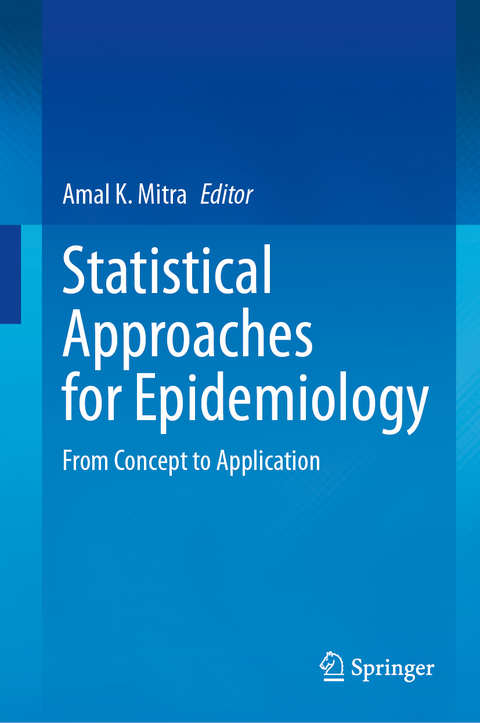
Statistical Approaches for Epidemiology
Springer International Publishing (Verlag)
978-3-031-41783-2 (ISBN)
This textbook provides the basic concepts of epidemiology while preparing readers with the skills of applying statistical tools in real-life situations.
Students, in general, struggle with statistical theories and their practical applications. This book makes statistical concepts easy to understand by focusing on real-life examples, case studies, and exercises. It also provides step-by-step guides for data analysis and interpretation using standard statistical software such as SPSS, SAS, R, Python, and GIS as appropriate, illustrating the concepts.
Through the book's 23 chapters, readers primarily learn how to apply statistical methods in epidemiological studies and problem-solving. Among the topics covered:
- Clinical Trials
- Epidemic Investigation and Control
- Geospatial Applications in Epidemiology
- Survival Analysis and Applications Using SAS and SPSS
- Systematic Review and Meta-Analysis: Evidence-based Decision-Making in Public Health
- Missing Data Imputation: A Practical Guide
- Artificial Intelligence and Machine Learning
- Multivariate Linear Regression and Logistics Regression Analysis Using SAS
Each chapter is written by eminent scientists and experts worldwide, including contributors from institutions in the United States, Canada, Bangladesh, India, Hong Kong, Malaysia, and the Middle East.
Statistical Approaches for Epidemiology: From Concept to Application is an all-in-one book that serves as an essential text for graduate students, faculty, instructors, and researchers in public health and other branches of health sciences, as well as a useful resource for health researchers in industry, public health and health department professionals, health practitioners, and health research organizations and non-governmental organizations. The book also will be helpful for graduate students and faculty in related disciplines such as data science, nursing, social work, environmental health, occupational health, computer science, statistics, and biology.
lt;b>Amal K. Mitra, MD, MPH, DIH, DrPH, is an internationally recognized scientist and leader in the field of public health. He has a dual background in medicine and in public health. He was a pioneer in developing a Master degree program in Epidemiology and Biostatistics at The University of Southern Mississippi in 1998. He was the Founding Program Director of Public Health in the Faculty of Medicine at Kuwait University. Currently, Dr. Mitra is a tenured Professor of Epidemiology and Biostatistics at Jackson State University (JSU) in Jackson, Mississippi. He has been serving as the Director of Global Health Program Initiatives at JSU School of Public Health. He is collaborating with several institutions in Bangladesh, Hong Kong, India, Kuwait, Nepal and Malaysia. Dr. Mitra is the recipient of many awards including the Fulbright-Nehru Academic and Professional Excellence Award 2022-2023, Lifetime Achievement Award 2013, the Fulbright Scholar Award 2007-2008, the Innovation Award for Applied Research 2004, the Distinguished Teaching Award 2000, and the Distinguished Faculty Researcher Award 1999. He is the author of Epidemiology for Dummies published by Wiley & Sons in 2023.
Chapter 1. Descriptive and Analytical Epidemiology .- Chapter 2. Cross-Sectional Study: The Role of Observation in Epidemiological Studies.- Chapter 3. Case-Control Study .- Chapter 4. Cohort Studies .- Chapter 5. Epidemiological Measures.- Chapter 6. Clinical Trials .- Chapter 7. Screening.- Chapter 8. Surveillance: The Role of Observation in Epidemiological Studies .- Chapter 9. Standardization .- Chapter 10. Causal Association .- Chapter 11. Bias, Confounding, and Effect Modifier .- Chapter 12. Epidemic Investigation and Control .- Chapter 13. Population Projection.- Chapter 14. Geospatial Applications in Epidemiology: Location, Location, Location .- Chapter 15. Survival Analysis and Applications Using SAS and SPSS .- Chapter 16. Systematic Review and Meta-Analysis: Evidence-based Decision-Making in Public Health.- Chapter 17. Sample Size Estimation .- Chapter 18. Missing Data Imputation: A Practical Guide .- Chapter 19. Artificial Intelligence and Machine Learning .- Chapter 20. A Step-By-Step Guide to Data Analysis Using SPSS: Iron Study Data.- Chapter 21. Data Analysis Using SPSS: Jackson Heart Study .- Chapter 22. Multivariate Linear Regression and Logistics Regression Analysis Using SAS.- Chapter 23. Epidemiology of COVID-19: An Update .
| Erscheinungsdatum | 14.12.2023 |
|---|---|
| Zusatzinfo | XXIX, 429 p. |
| Verlagsort | Cham |
| Sprache | englisch |
| Maße | 155 x 235 mm |
| Gewicht | 847 g |
| Themenwelt | Mathematik / Informatik ► Mathematik ► Statistik |
| Studium ► Querschnittsbereiche ► Prävention / Gesundheitsförderung | |
| Schlagworte | Applied epidemiology • case-control study • Clinical Trials • Cohort Study • Concept to application • cross-sectional study • Epidemic investigation • Jackson Heart Study • missing data • Statistical Methods • Types of epidemiological research • Use of artificial intelligence in Epidemiology • Use of machine learning |
| ISBN-10 | 3-031-41783-6 / 3031417836 |
| ISBN-13 | 978-3-031-41783-2 / 9783031417832 |
| Zustand | Neuware |
| Haben Sie eine Frage zum Produkt? |
aus dem Bereich


